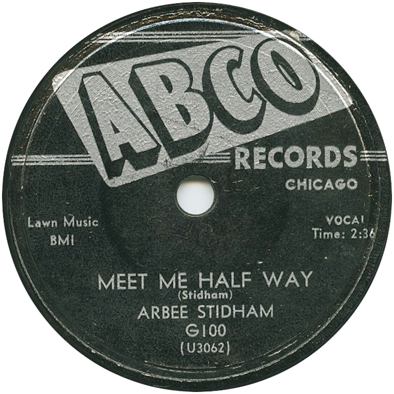

Revision note: We have moved the date of the first Abco session back to January 1956, because Cash Box coverage of the company's first two releases started in the February 25 issue. During the label's first three months, Eli Toscano was talking more often to Cash Box than to Billboard, and he ran ads in Cash Box through the end of April 1956. We have also found a review for the last Abco, G107: it ran in Cash Box on July 14, 1956. Meanwhile, Cash Box reviewed Abco G105—on September 1, 1956, after Cobra was already buying ads. We have corrected our listings for the Rip-Chords session and the Morris Pejoe session, where we previously had Magic Sam on guitar. Blues guitar experts, including Mark Mumea and Dick Shurman, have told us that the lead guitarist was probably Wayne Bennett. We'd already known that Bennett appeared on two other sessions for Abco.
Abco was jointly owned by Joe Brown (1904-1976) and Elias P. Toscano, who was born on April 17, 1924. The name derived from Toscano's business located at 2854 West Roosevelt Road, a television store and repair shop that also housed A. B.'s One Stop. Abco would end up sharing the address. A piece of Abco may also have been owned by Richard Stamz (1905-2007), a disk jockey with a hit show on WGES who had ambitions to break into the record business; in 1971, Stamz gave George Paulus some Abco letterhead that was still in his possession.
Opening its doors in January 1956, Abco was by any measure a short-lived operation. On July 11, a long session took place at Boulevard Studio, featuring four different artists. It was slated for Abco originally, but in August, before any of the material had been released, Joe Brown returned to his JOB activities. Eli Toscano split off with a new partner, Howard Bedno, to start a new label called Cobra, which put out all of the July 11 material in September and would quickly go on to further renown.
Abco releases all carried credits to Joe Brown's house publishing company, Lawn Music. When Toscano started Cobra, he opened a new music publishing company for it.
Songwriter Ted Daniels brought the Rip Chords to Abco and produced other sessions.
Abco was responsible for just 8 newly recorded releases—9 all together—but this short series is more than enough to secure it a place among the important independent labels in Chicago. All Abco sides were cut at Universal Recording, so even the tracks that made a definite move in the direction of rock and roll still boasted high-grade sonics.
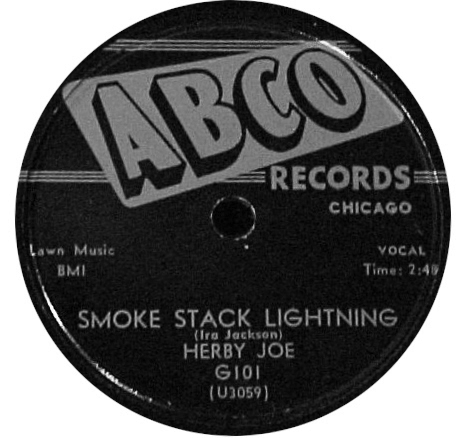
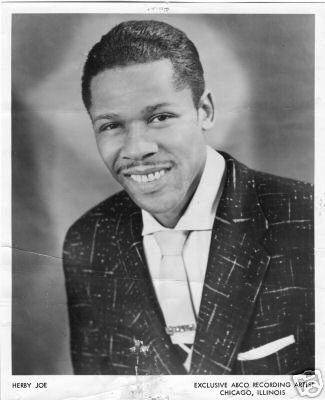
Herby Joe (voc); (ts); (ts); (p); Wayne Bennett (eg); (eg); (b); (d).
Universal Recording, Chicago, c. January 1956
| U3059 | Smoke Stack Lightning (Ira Jackson) | Abco G101, Wolf 120.298 [CD], P-Vine [J] PCD 18531 | |
| U3060 | Dreamed (Last Night) (Walker) | Abco G101, Wolf 120.298 [CD], P-Vine [J] PCD 18531 |
Although a publicity photo of Herby Joe is extant, nothing is known of this singer, who shared this session with Arbee Stidham (see Ab2). Herby Joe cut the first two tracks at the session but got the second release from it. "Smoke Stack Lightning" is not the one-chord number by Howlin' Wolf that, it so happens, was also recorded in January 1956 and became famous in Feburary or March of that year. Herby Joe's is a blues about domestic discord, with lots of spoken asides over stop-time. The model is "Hoochie Coochie Man" or "I'm a Man," rather than "I Don't Know."
Abco G100 and G101 were advertised in Cash Box on February 26, 1956 (p. 34), March 3 (p. 30), and March 10 (p. 30).. Abco G101 was reviewed in Billboard on March 3, 1956 (pp. 74-75).
Supposedly some copies of G101 incorrectly show "I'll Always Remember You" (actually by Arbee Stidham; see Ab2) as the title for U3060, although they actually play Herby Joe's "Dreamed." We have yet to see one of these.
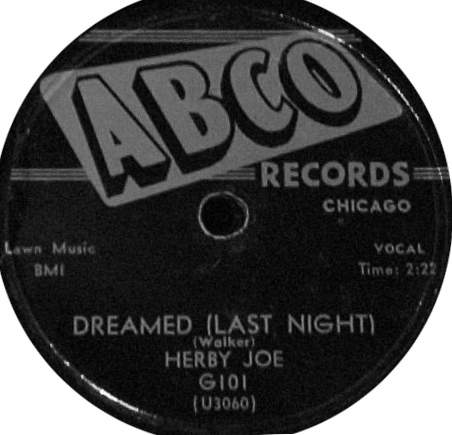
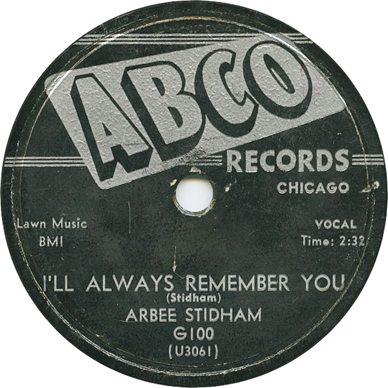
Arbee Stidham (voc); (ts); (ts); (p); Wayne Benett (eg); (eg); (b); (d).
Universal Recording, Chicago, c. January 1956
| U3061 | I'll Always Remember You (Stidham) | Abco G100, Wolf 120.298 [CD], P-Vine [J] PCD 24074, P-Vine [J] PCD 18531 | |
| U3062 | Meet Me Half Way (Stidham) | Abco G100, Flyright [Br] FLY 582, P-Vine Special [J] PLP-9027, Wolf 120.298 [CD], P-Vine [J] PCD 24074, P-Vine [J] PCD 18531 |
Arbee Stidham had been recording as a singer since 1947, and maybe as a guitarist since 1952. Born in DeValls Bluff, Arkansas, on February 9, 1917, he was the son of Luddie Stidham, who played in Jimmie Lunceford's big band. Arbee had been a professional musician since he was 12 or 13. He originally played the alto saxophone, but had to give up the horn when he started getting a nosebleed every time he performed on it. His singing voice was a strangely portentous, quavery bass that made him seem much older than he really was.
While at RCA Victor, Stidham enjoyed a big hit with the ballad "My Heart Belongs to You." Stidham often recorded with Sax Mallard during this period. His Victor years ended in March 1950. He resurfaced on Checker, doing two sessions in 1952 and a third in 1953.
He had been away from the studios for nearly three years when Abco picked him up.
Abco G100 and G101 were advertised in Cash Box on February 26, 1956 (p. 34), March 3 (p. 30), and March 10 (p. 30).
"Meet Me Half Way" is another number with a lot of stop-time, not radically different from "Smoke Stack Lightning." "I'll Always Remember You" is one of Stidham's patented half-ballads.
The entire session features powerful lead guitar, which sounds like the work of Wayne Bennett; one of the saxophonists solos on "I'll Always Remember."
Flyright FLY 582, Fishin' in My Pond: Chicago Blues Bands, was released in Britain in 1981. P-Vine Special PLP-9027, Screamin' and Cryin', was released in Japan in 1981. P-Vine PCD 24074 was released in Japan in 2001; the title was Chicago Blues Guitar Killers!.
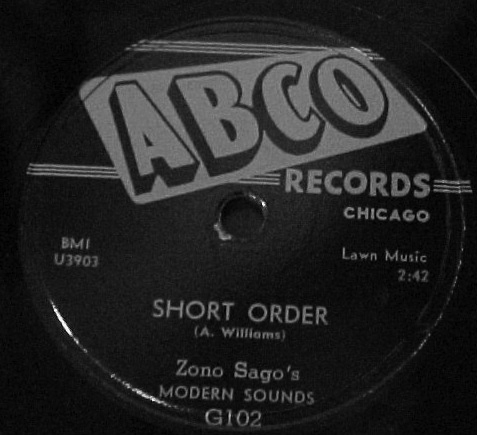
Zono Sago (Allan Williams) (d); Lucius "Little Wash" Washington (ts); (bars -1); (p); (b); (cga, bgo).
Universal Recording, Chicago, c. February 1956
| 3093 U3903 on label |
Short Order (A. Williams) | Abco G102, Wolf 120.298 [CD], P-Vine [J] PCD 18531 | |
| 3094 U3904 on label |
Jivin' at Random (A. Williams) -1 | Abco G102, Wolf 120.298 [CD], P-Vine [J] PCD 18531 |
Allan Williams, who went by the curious stage name of Zono (or Zona) Sago, was one of the artists Joe Brown brought to Abco. His previous recordings had all been for JOB.
Williams was eclectic. His first session for JOB was a 1952 blues outing by John Lee Henley that has become legendary. On October 5, 1953, Williams cut two Calypso sides under the Zona Sago name, then backed Memphis Minnie, her husband Little Son Joe (Ernest Lawlars), and Eurreal "Little Brother" Montgomery on a marathon blues session. Two more Calypso sides followed in March or April 1954, and another two toward the end of that year (even by the usual JOB standards, the Sago singles on JOB 1100, 1106, and 1109 are extraordinarily rare items).
Just to show what else he had in his bag of tricks, Williams recorded with Abco as the leader of a jazz combo. Eli Toscano pitched the record (Cash Box, March 24, 1956, p. 31) as part of "the new jazz line that's soon to appear."
The pianist on "Short Order" sounds like Willie Jones. Conga and bongo are prominent on both sides. "Jivin' at Random" adds a baritone sax to the proceedings; both saxophonists get solos on this track. Armin Büttner has identified the tenor saxophonist as Lucius Washington, who was just beginning to get the calls for sesion work; during 1956 Little Wash would be very busy recording with Al Smith groups.
The matrix numbers were misprinted on the labels. In the trail-off vinyl, they are 3093 and 3094, as would be expected from the approximate date of the recording.
After Toscano told Cash Box about both releases on March 24 (p. 31), Abco G102 and Freddie Hall's G103 were advertised in Cash Box on March 31, 1956 (p. 24). G102 was reviewed in Billboard on April 21, 1956 (p. 56) and in Cash Box on the same date (p. 34).
Williams would make just one more session that we know of, a Calypso outing for Argo toward the end of 1956. This was released under the name of his island group, The Emperor. Argo 5264 was reviewed in Billboard on February 23, 1957 (p. 62) and in Cash Box on the same date (p. 38)..
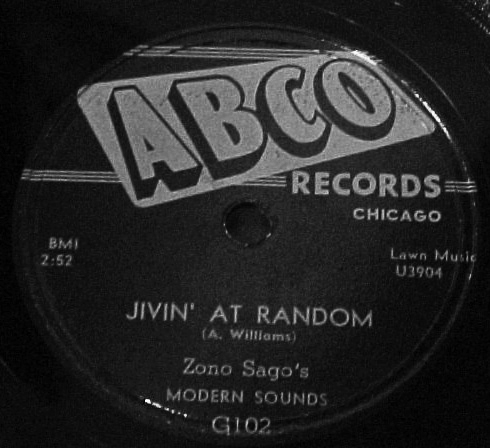
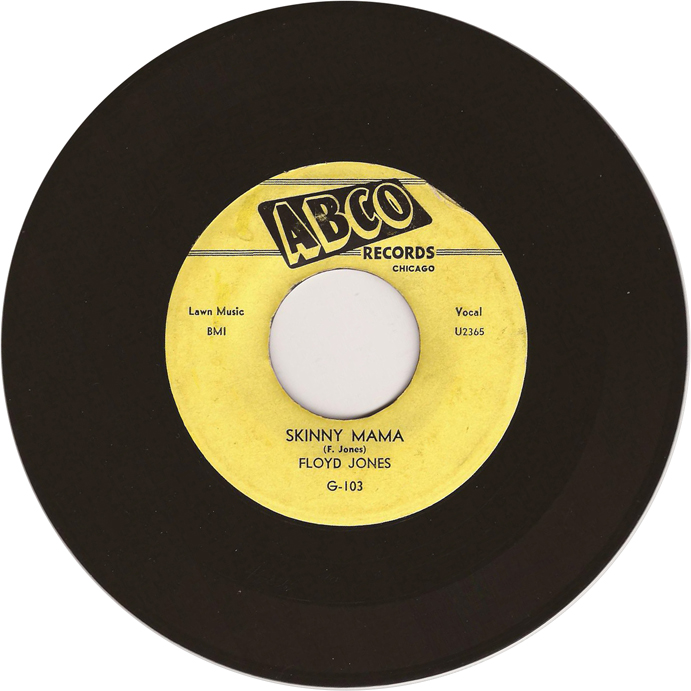
Before the Freddie Hall single came out (see Ab5), Joe Brown had a slightly different idea for Abco G-103. He made a trial run at reissuing a JOB recording from 1953. "On the Road Again" (title truncated on the reissue) and "Skinny Mama" were blues classics by Floyd Jones, but the rationale was, well, unclear for putting them out again on Abco in 1956. Brown seems to have come to the same conclusion, as the Floyd Jones variant of G-103 is extremely rare today. The label design is the same as on other Abcos, but on the 45 labels, the background color is pale yellow (like a washed out JOB label from 1953), not pale greenish blue. (If the Floyd Jones G-103 was like every other Abco, it was also released on 78—but we have not seen a copy in that format.)
Floyd Jones (eg, voc); Sunnyland Slim (p); Moody Jones (b); unidentified (d).
Universal Recording, Chicago, January 31, 1953
| U2365 | Skinny Mama (Jones) | JOB 1013, Abco G-103 [yellow label], Boogie Disease LP 101/2, Flyright [Br] LP 584, P-Vine Special [J] PLP-9028, Flyright [Br] FLYCD 28, Paula PCD-19, Westside WESA 910 [CD], Westside WESD 233 [CD], Classics 5130 [CD] | |
| U2367 | On the Road (Jones) | JOB 1013, Abco G-103 [yellow label], Muskadine LP 1, Muskadine LP 100, Flyright [Br] LP 584, P-Vine Special [J] PLP-9028, Flyright [Br] FLYCD 28, Paula PCD-19, Westside WESA 910 [CD], Westside WESD 233 [CD], Classics 5130 [CD], Fuel 302 061 939 [CD] |
The original recording was made during JOB's alliance with Chance Records, and released in the summer of 1953. The release date for the yellow-label G-103 was most likely in February 1956. (An item in Cash Box for March 3, 1956, p. 29, enumerated the Abco artists as Arbee Stidham, Herby Joe… and Floyd Jones. "Eli [Toscano], orignally a one-stop proprietor, says: 'Joe Brown is helping me discover new artists and fitting them into our picture.'") In any event the Floyd Jones release preceded the G-103 that most of us know, by Freddie Hall (see Ab5 below), and couldn't have been pressed in quantity. It was not reviewed in the trade papers. Our thanks to Dr. Robert Stallworth for alerting us to this unusual item.
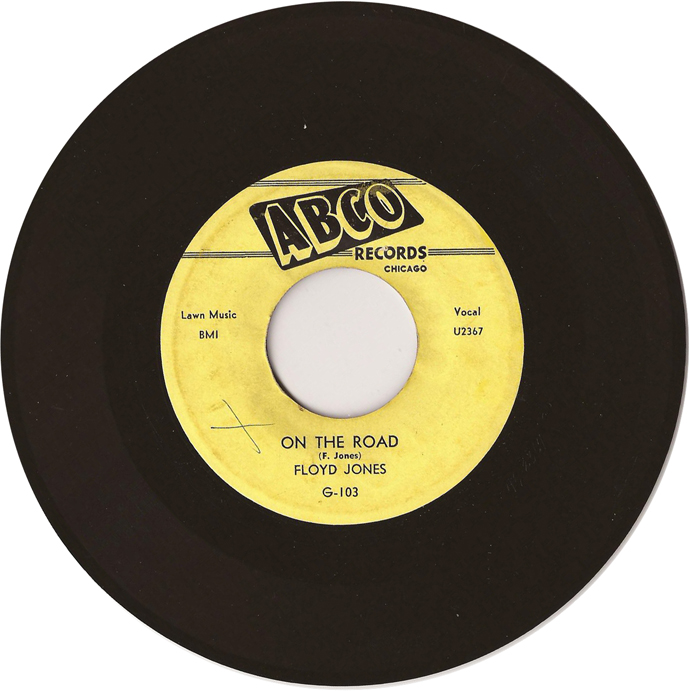
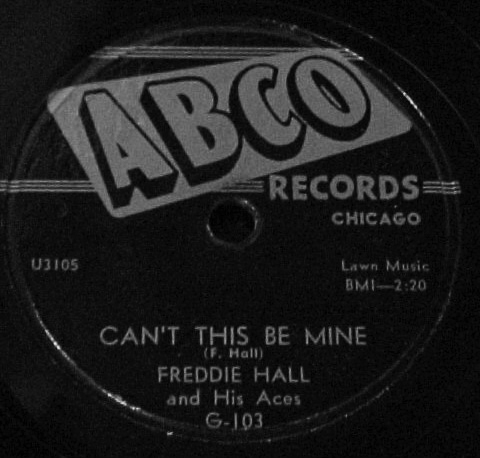
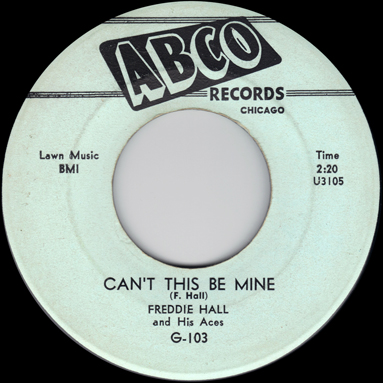
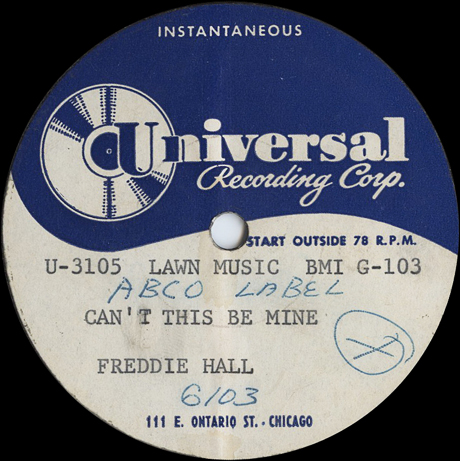
Freddie Hall (voc, p); Louis Myers (eg); Dave Myers (eg); Willie Dixon (b), Eugene Lyons (d).
Universal Recording, Chicago, c. February 1956
| U3105 | Can't This Be Mine (Hall) | Abco G-103, Flyright [Br] FLY 594, Wolf 120.298 [CD], P-Vine [J] PCD 18531 | |
| U3106 | Playin' Hard to Get (Hall) | Abco G-103, Wolf 120.298 [CD], P-Vine [J] PCD 18531 |
Freddie Hall had previously recorded one single for J. Mayo Williams' Ebony label in 1954. Poorly distributed, like all 1950s Ebonys, it was subsequently dealt to Chance, which is how we presume Joe Brown encountered him.
Hall benefits from fierce accompaniment by the Aces, which essentially makes this a rock and roll record.
Fancourt and McGrath's Blues Discography gives the personnel minus the pianist—who is recessed way behind the two guitars but still clearly audible. From a photo that Dave Myers gave to Scott Dirks, we can see Freddie Hall seated at the piano. As identifed by Dave Myers, the participants, from left to right, were Eli Toscano (party hidden behind the drummer), Eugene Lyons, Louis Myers, Dave Myers, Willie Dixon, and Freddie Hall (seated at the piano). The photo appears to have come from a rehearsal from the Abco session.
On March 17, 1956, Cash Box (p. 34) announced that Freddie Hall and Floyd Jones had been signed to Abco (both would get releases labeled G103, though the Floyd Jones record had a very short run). Toscano told Cash Box about G102 and Freddie Hall's G103 on March 24 (p. 31), then the two singles were advertised in Cash Box on March 31, 1956 (p. 24). Freddie Hall's Abco G103 was reviewed in Cash Box on April 14, 1956 (p. 38) and in Billboard on April 21, 1956 (p. 54).
Hall subsequently recorded on two occasions for the C. J. label, both in 1959. We expect that Ted Daniels was the producer on those. From a session with Ike Perkins on lead guitar came C J 601 ("She's a Upsetter" b/w "I Love This Carrying On") and C J 602 ("Little Baby's Rock" b/w "I'll Be So Glad"). A second session that included a doowop group—the combined ensemble went as The Night Rockers—produced C J 610 ("Love and Affection" b/w "She Was My First Love").
Hall recorded two further sides ("That's What I Want, Babe" b/w "I'm Jealous") at MBS studio, probably also toward the end of the 1950s. Surfacing only recently on YouTube (at http://www.youtube.com/watch?feature=player_detailpage&v=z4E9q87kCFU and http://www.youtube.com/watch?feature=player_detailpage&v=6SubQQuE038) these were presumably intended for release—a bit of reverb has been added—but they never appeared and we don't know which label was involved.
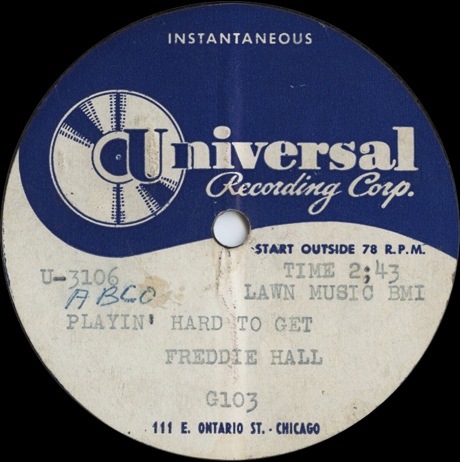
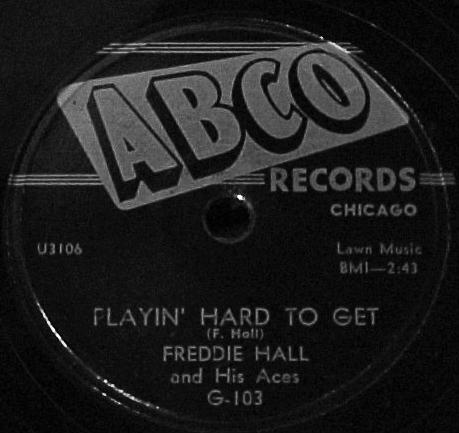
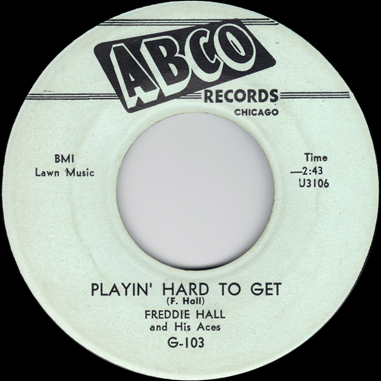
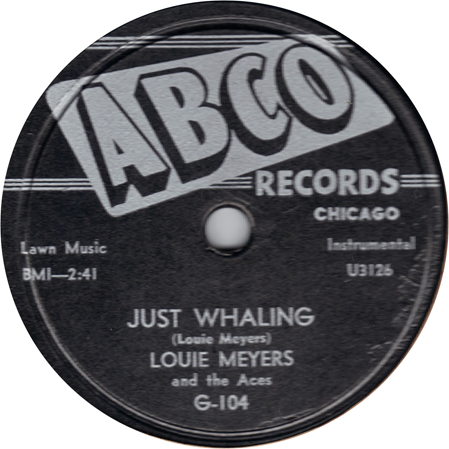
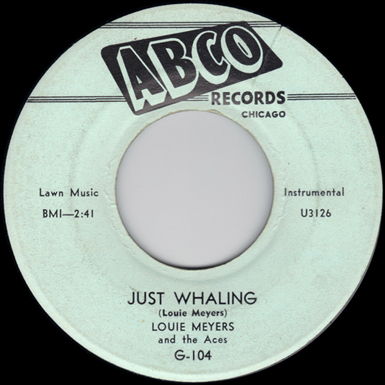
Louis Myers (hca); Dave Myers (eg); Willie Dixon (b); Eugene Lyons (d).
Universal Recording, Chicago, c. March 1956
| U3126 | Just Whaling ("Meyers") | Abco G104, Flyright [Br] FLY 567, P-Vine Special [J] PLP-9023, Wolf 120.298 [CD], P-Vine [J] PCD 24075, P-Vine [J] PCD 18531 | |
| U3127 | Bluesy (Myers) | Abco G104, Flyright [Br] FLY 567, P-Vine Special [J] PLP-9023, Wolf 120.298 [CD], P-Vine [J] PCD 24075, P-Vine [J] PCD 18531 |
This is a tribute to Little Walter by Louis and Dave Myers. Their band, the Aces, was Walter's combo between his decision to go solo in 1952 and Louis Myers' departure in 1954. Willie Dixon announces his participation with some string snapping toward the end of "Bluesy."
Abco G104 was released in April 1956. The first two ads in Cash Box for the release (April 7, 1956, p. 39, and April 14, p. 35, both in conjunction with G102 and G103) were for "Just Whailin'." In his pitch to Cash Box (April 7, 1956, p. 34), Eli Toscano called it 'Just Whalin'." The April 21 ad for G104 (p. 33, also in conjunction with G102 and G103), spelled the title as on the label. Cash Box reviewed the single on April 28, 1956 (p. 31).
Flyright [Br] FLY 567, King Cobras: Chicago Kings of the Harmonica, was released in 1980. P-Vine Special PLP-9023 was part of a 4-LP boxed set, released in Japan in 1981 as 9022/9025. The title was Chicago Blues: A Quarter Century. "Just Whaling" was "corrected," as it has been on most reissues, to "Just Wailin'." "Whaling" as a slang term is attested in early 1950s writing about R&B.
P-Vine PCD 24075, Chicago Blues Harp Blowers!, was released in Japan in 2001.
Louis Myers was born in Byhalia, Mississippi, on September 18, 1929. His older brother David was born in Byhalia on October 30, 1926. They were active on the Chicago music scene in the late 1940s; in 1950, they assembled a formidable quartet known as the Four Aces, with Amos "Junior" Wells on harmonica and Fred Below on drums. When Little Walter went solo, Junior Wells replaced him with Muddy Waters and the Aces became Walter's band.
In later years, Louis Myers would record an occasional harmonica feature in a similar vein. Louis Myers died on September 5, 1994; Dave Myers, who played electric bass in his later years, died on September 3, 2001.
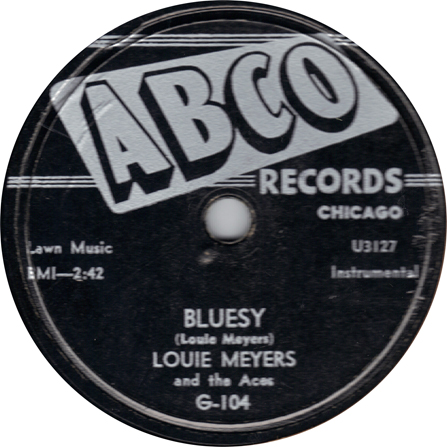
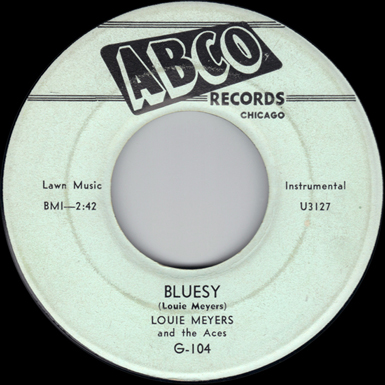
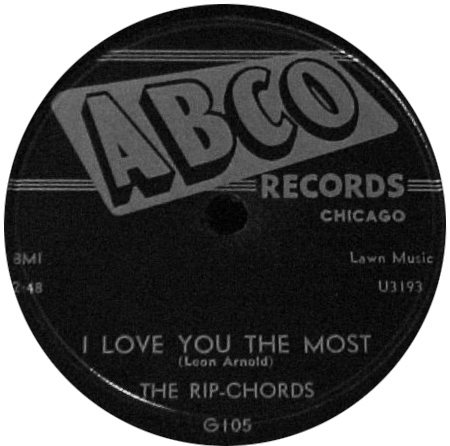
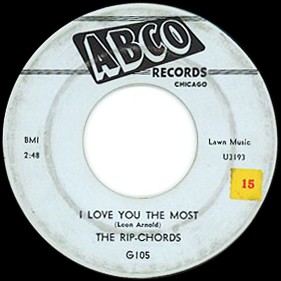
The Rip-Chords: Leon Arnold (lead); John Gillespie (alto); George Vinyard (first tenor); Davie Hargrove (second tenor): Lester Martin (bass); Wayne Bennett (eg); Lucius Washington (ts); unidentified (ts, p, b, d).
Universal Recording, Chicago, c. May 1956
| U3193 | I Love You the Most (Leon Arnold) | Abco G105, Wolf 120.298 [CD], P-Vine [J] PCD 18531 | |
| U3194 | Let's Do the Razzle Dazzle (Ted Daniels) | Abco G105, Wolf 120.298 [CD], P-Vine [J] PCD 18531 |
The Rip-Chords were a doowop group from the South Side. As the Knights of Rhythm, they had recorded for Vee-Jay on June 8, 1955, with backing from an Al Smith group. However, it quickly became apparent that Vee-Jay just wanted Leon Arnold's songs. The June 8 session had been shared with the El Dorados, and on October 21, 1955, Vee-Jay brought them but not the Knights into the studio to record "I'll Be Forever Loving You." The Knights' version from June 8 was left in the can; the El Dorados' version, recorded on October 21, 1955, was a big hit for the rival group.
After the El Dorados' version was released, the Knights left Vee-Jay and, in commemoration of the way they had been treated, changed their name to the Rip-Chords. Our personnel for the Rip-Chords comes from Robert Pruter's book Doowop: The Chicago Scene.
Note the composing credit to the producer on this session.
One of the tenor saxophonists—Lucius Washington to our ears—takes a solo on "Razzle Dazzle."
Abco G105 was reviewed, none too favorably, in Billboard on June 23, 1956 (p. 61). Abco wasn't buying space in Cash Box in May and June 1956, so the release passed without notice then. When Eli Toscano started buying ads for Cobra, however, Cash Box suddenly remembered the Abco single, giving it a delayed review on September 1, 1956 (p. 37). Most likely this was because the Rip Chords appeared at the Chicago Defender's Bud Billiken picnic (August 11, 1956) and Toscano thought he might get some further sales (Cash Box, August 25, 1956, p. 28).
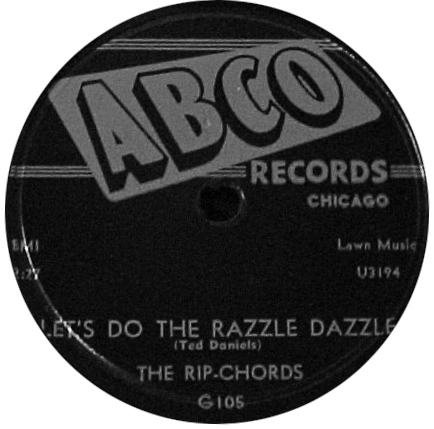
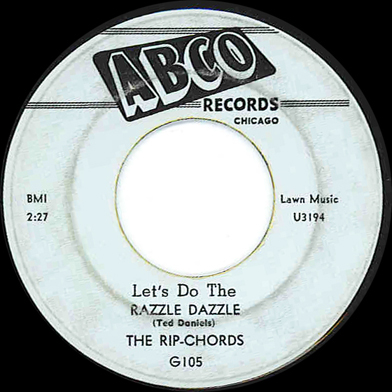
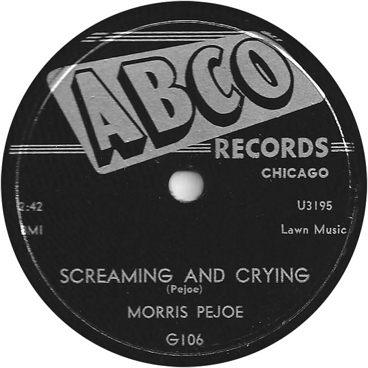
Morris Pejoe (eg, voc); Wayne Bennett (eg); Lucius Washington (ts); unidentified (ts, p, b, d).
Universal Recording, Chicago, c. May 1956
| U3195 | Screaming and Crying (Pejoe) | Abco G106, Flyright [Br] FLY 582, P-Vine Special [J] PLP-9027, Wolf 120.298 [CD], P-Vine [J] PCD 24074, P-Vine [J] PCD 18531 | |
| U3196 | Maybe Blues (Pejoe) | Abco G106, Flyright [Br] FLY 582, P-Vine Special [J] PLP-9027, Wolf 120.298 [CD], P-Vine [J] PCD 24074, P-Vine [J] PCD 18531 |
Guitarist-singer Morris Pejoe was born Morris Pejas in Palmetto, Louisiana, in 1924. He began his career playing the violin. After moving to Beaumont, Texas, in 1949, he switched to guitar. In 1951 Pejoe was in Chicago, performing with pianist Henry Gray. During 1952-53 he recorded three sessions for Checker, accompanied by Gray among others; the Chess brothers put out two singles on him before dropping him from their roster. Next, he did a session for United, in December 1954 (it was actually made in Al Smith's basement, with sound quality to match, and United eventually decided not to release anything from it).
On May 5, 1955, Pejoe recorded two sides for Vee-Jay, with powerful accompaniment by Henry Gray, Milton Rector, and Earl Phillips. Abco picked up him right after his one-year contract with Vee-Jay expired.
Pejoe shared a session with The Rip-Chords (see Ab6). "Maybe Blues," which Pejoe recorded several times, is actually addressed to a woman named May Bea (or should that be Mae Bea?).
According to the liner notes to the Wolf CD reissue (see below), Samuel Maghett (soon to be much better known as Magic Sam) played lead guitar on this session. However, several guitar experts have identified Wayne Bennett as the lead. The lead work was emphatically not Pejoe's.
Abco G106 was reviewed in Billboard on June 23, 1956 (p. 61).
Flyright FLY 582, Fishin' in My Pond: Chicago Blues Bands, was released in Britain in 1981. P-Vine Special PLP-9027 was a various-artists compilation, released in Japan in 1981. The title, Screamin' and Cryin', was borrowed from this session. P-Vine PCD 24074 was released in Japan in 2001; the title was Chicago Blues Guitar Killers!.
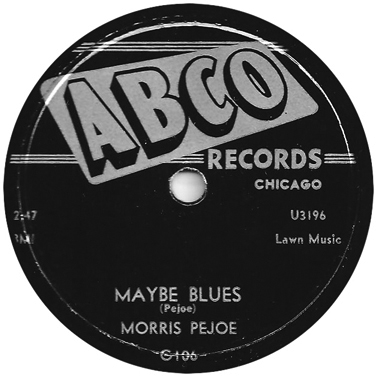
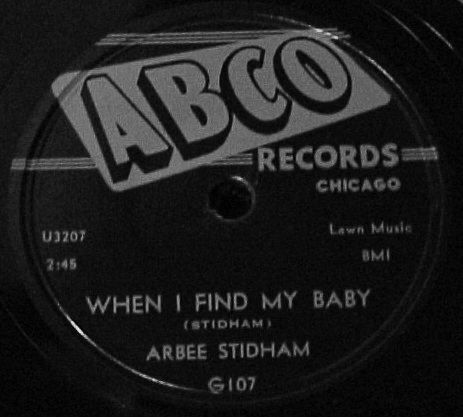
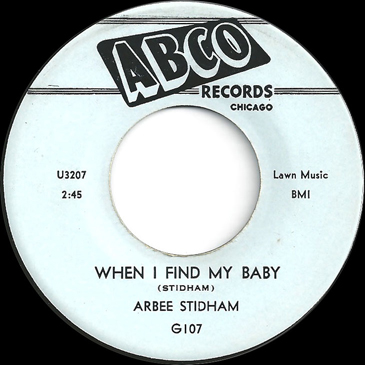
Arbee Stidham (voc); Walter Horton (hca and overdubbed hca -1); Harold Ashby (ts); Lucius Washington (ts); Art Simms (p); Wayne Bennett (eg); unidentified (eg); Willie Dixon (b); Odie Payne (d).
Universal Recording, Chicago, c. May 1956
| U3207 | When I Find My Baby (Stidham) -1 | Abco G107, Flyright [Br] FLY 567, P-Vine Special [J] PLP-9024, Wolf 120.298 [CD], P-Vine [J] PCD 24075, P-Vine [J] PCD 18531 | |
| U3208 | Please Let It Be Me (Stidham) | Abco G107, Flyright [Br] FLY 582, P-Vine Special [J] PLP-9027, Wolf 120.298 [CD], P-Vine PCD 24074, P-Vine [J] PCD 18531 |
Arbee Stidham was the only artist to record for Abco twice. He got to open the release series—and to close it. The guitar soloist on "Please Let It Be Me" is distinctive. Personnel is as per Fancourt and McGrath's Blues Discography; however, the liners to the Blue Moon Arbee Stidham reissue, BMCD 6040, make a persuasive argument that there are not, in fact, two harmonica players on "When I Find My Baby." There is just Walter Horton on unamplified harmonica, overdubbed on Walter Horton playing amplified harmonica!
The tenor saxes play on both sides. "Let It Be Me" sounds like a Willie Dixon production, so we have filled in Harold Ashby (one of Dixon's favorites in 1956) and Lucius Washington on the saxes. "When I Find My Baby" has somewhat congested sonics because of the two harmonicas up front, one of them an overdub, plus the tenor saxes riffing in the far background.
Although G106 was never mentioned in Cash Box, and Abco had quit buying ads, G107 somehow scored a review, on July 14, 1956 (p. 35). The reviewer complained about the sonics on "When I," attributing them to "poor engineering." From the date of the Cash Box review, we estimate a June release and a May recording.
Flyright FLY 567, King Cobras: Chicago Kings of the Harmonica, was released in Britain in 1980. Flyright FLY 582, Fishin' in My Pond: Chicago Blues Bands, was released in Britain in 1981. P-Vine Special PLP-9024 was part of a 4-LP box (9022/9025), issued in 1981 in Japan as Chicago Blues: A Quarter Century. P-Vine Special PLP-9027 was also released in Japan in 1981, under the title Screamin' and Cryin'. P-Vine PCD 24074 was released in Japan in 2001; the title was Chicago Blues Guitar Killers!. By contrast, P-Vine PCD 24075, released that same year, was titled Chicago Blues Harp Blowers!
After Abco folded, Stidham made a strong showing in 1957 for the fading States label, backed by an Al Smith band with Earl Hooker on lead guitar and Sugarman Penigar and Tommy "Madman" Jones on the saxes. He did not record again until the blues revival kicked in, cutting an album for Bluesville and two for Folkways in 1960 and 1961; these featured his guitar work. A studio session, left unreleased for years, was done for Sam Phillips in 1965. Stidham's last record was an LP made for Bob Shad's Mainsteam label in 1972, with a band led by Ernie Wilkins. Stidham appeared in a short film made in Memphis in 1973, in which he played harmonica as well as guitar, but was retired from music by the end of that decade. He died in Chicago in April 1988.
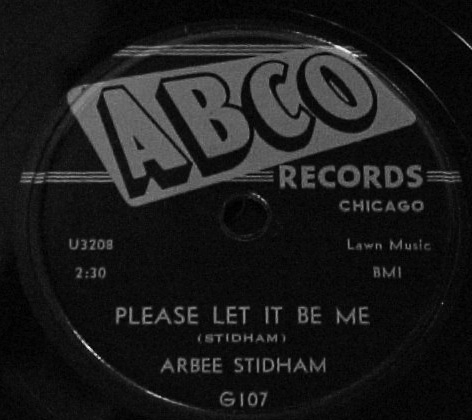
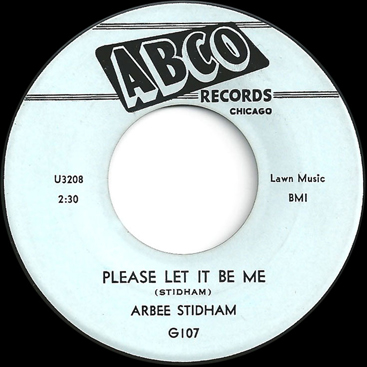
Eli Toscano got his new operation off to a fast start. A rising bluesman named Otis Rush was brought into Boulevard Studio on July 11, sharing a long session with Walter "Shakey" Horton (now also getting to record as a leader) and two vocal groups, The Clouds and The Calvaes. The rest of the band was put together by Willie Dixon, who would be involved in most Cobra sessions. Before anything could be released from the outing, Toscano and Brown decicded to split up, and Toscano acquired a new business partner, Howard Bedno. Cobra 5001 by The Clouds came out in early September 1956 (reviewed in Billboard, September 1, 1956, p. 51). Cobra 5000 ("I Can't Quit You Baby" by Otis Rush) was released around the same time (and rated a company investment in Billboard ads, starting September 8, 1956, p. 55, and continuing during the succeeding weeks). In a little while "I Can't Quit You" would reach #9 on the R&B chart (Billboard, October 20, 1956, p. 51). The other two singles from the first session were released in late September. In 1957, Toscano would give Magic Sam his first opportunity to record as a leader.
The new label's first session, at Boulevard Studio on July 11, 1956, yielded matrix numbers U3236 through 3243, indicating mastering by Universal; a surviving sheet from Boulevard (for U3239 and U3240) refers to the client as "Abco". Followups by Otis Rush and Harold Burrage ensued at Boulevard in October (U3331 through 3334, shortly after the first session for Ping). A Sunnyland Slim session, in November or December, was done at Universal. Then, in a money-saving move, Toscano set up his own studio behind A. B.'s One Stop, with results varying from professional to semi-professional. And when A. B.'s One Stop moved 5 blocks to the west, the studio moved with it (Cobra Studio #2 was said to have been a converted garage.) Nearly all of his company's remaining output was cut there. Cobra went on to produce a total of 34 releases, making it much more prolific than Abco. Its subsidiary Artistic, which opened for a brief run in 1958, added 6 more. For whatever reason, none of the Abco artists would ever record for Cobra.
Cobra went out of business in 1959, and Toscano apparently exited the record business. In 1960, the former Cobra complex on West Roosevelt Road was taken over by Richard Stamz, who ran his Paso, Foxy, Dawn, and Halo levels out of the location until 1963. Eli Toscano died on September 21, 1967, when, during an effort to start his boat's motor, he fell backwards into the Fox River and drowned.
By December 1956, Joe Brown was back in the recording studio, cutting a single by the gospel group The Heavenly Kings and another by singer Earl H. Pugh. During 1957, JOB reverted to quiescence while Brown worked on various projects with Vincent "Bud" Brandom and Leonard Allen; releases would resume in 1958. What Brown was doing at JOB would not attract nearly as much attention as the big hit by Otis Rush and the high-profile records by Magic Sam, Harrold Burrage, and Buddy Guy for Toscano's company. Yet his boutique operation would significantly outlive Cobra, which quit recording by the end of 1958 and closed toward the end of 1959. None of the Abco artists would end up recording again for JOB.
Ted Daniels produced The Calvaes' two sessions for Cobra, made one session in 1958 for Checker with a new Calvaes lineup, then went on to produce sessions for small Chicago labels such as C. J. and Bea & Baby. During the 1960s, he was active with Chess, mpac! and One-derful.
Our thanks to Dan Ferone of Chicago Home of Beverly Records for photos of some rare Abco 78s—and for encouraging us to add an Abco page. Our thanks also to Scott Dirks for the first photo we have seen of Freddie Hall, along with identifications provided by Dave Myers.
The label's entire newly recorded output (16 tracks) was reissued in the 1990s on Wolf 120.298, a CD logically titled Abco Records. Ted Daniels assisted with the project, and Ron Bartolucci's liner notes contain many valuable details, though they are inaccurate in other respects: Abco is said to have opened in April 1956, and to have used Eli Toscano's home-built studio (a notion disproven by one listen to any Abco in a decent state of preservation). The Complete Cobra Singles, 4 CDs on P-Vine PCD 18528/31, was released in 2008. It presents all of the released sides on Cobra and Artistic, and includes all of the newly recorded Abco sides for good measure. The set, unfortunately, quickly went out of print in Japan and has been nearly impossible to obtain anywhere else.
Click here to return to the Red Saunders Research Foundation page.
Click here to return to Robert L. Campbell's Home page.